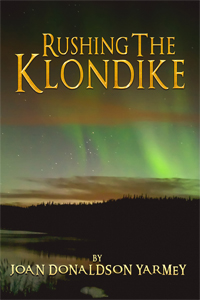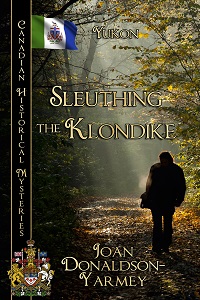
https://books2read.com/Romancing-the-Klondike

https://books2read.com/Rushing-the-Klondike

https://books2read.com/Sleuthing-the-Klondike
https://bwlpublishing.ca/donaldson-yarmey-joan/
I am a proud Canadian author of over twenty fiction and non-fiction books in my long writing career. But I am just one of thousands of published writers from this huge country. Canada has had a long and illustrious history of producing world renown authors and books going all the way back to the 18th century.
Frances Moore was born in England in 1724. She was a well-known poet and playwright in England before she and her husband, Reverend John Brooke moved to Quebec City in 1763, for John to take up the post of army chaplain. During her time there Frances wrote The History of Emily Montague, a love story set in the newly formed Quebec province.
The story is told through the voices of her characters by way of personal letters between the two. This is known as epistolary (of letters) type of writing and it was popular during the1700s in Europe. The Brookes’ returned to England in 1768 and the novel was published in 1769 the London bookseller, James Dodsley. The History of Emily Montague was the first novel written in what is now Canada and the first with a Canadian setting. Frances died in 1789.
Ontario
William Robertson Davies was born August 28, 1913 in Thamesville, Ontario (ON). He grew up surrounded by books and he participated in theatrical productions, developing a lifelong love of drama. He attended Upper Canada College then studied at Queen’s University at Kingston, ON. He moved to Oxford, England where he received a Bachelor Degree in Literature from Balliol College in 1938. His thesis, Shakespeare’s Boy Actors, was published in 1939 and he began acting in London.
William married Brenda Mathews, an Australian who was working as a stage manager. They moved to Canada in 1940 and he began a career as literary editor at Saturday Night magazine. Their first child was born in December 1940. Two years later he accepted the position of editor of the Peterborough Examiner in Peterborough, ON. During this time he wrote humorous essays under the name Samuel Marchbanks and wrote and produced many stage plays.
In 1947, several of his essays were published in The Diary of Samuel Marchbanks, and The Table Talk of Samuel Marchbanks came out in 1949. Davies used his early upbringing to provide themes for his novels and his first novel Tempest Tost was published in 1951. His second, Leaven of Malice, came out in 1954. In 1955 he became publisher of the Peterborough Examiner and his third novel, A Mixture of Frailties was published in 1958.
Besides novel and play writing, and being a newspaper publisher, Davies taught literature at Trinity College at the University of Toronto from 1960 until 1981. He left his post as publisher of the Peterborough Examiner in 1962 and became a Master of Massey College, the University of Toronto’s new graduate college, in 1963. Along with his father William Rupert Davies and his brother Arthur Davies, William bought the Kingston Whig-Standard newspaper, CHEX-AM and CKWS-AM radio stations, and CHEX-TV and CKWS-TV television stations. His third book of essays, Samuel Marchbanks’ Almanack was published in 1967.
William Robertson Davies wrote a total of eighteen fiction and non-fiction books, plus fifteen plays. He won many awards for his writing including the Governor-General’s Literary Award and the Stephen Leacock Award for Humour. He was named a Companion of the Order of Canada.
William Robertson Davies died on December 2, 1995, in Orangeville ON.
Josiah Henson was born on June 15, 1789, into slavery in Port Tobacco, Charles County, Maryland. When his family was separated by each being sold to different plantations, his mother pleaded with her new owner, Isaac Riley, to buy her youngest son so she would have him with her. Riley agreed and Josiah came to work for him. Josiah was twenty-two years-of-age when he married. He also became a Methodist Minister and was made the supervisor of his master's farm.
In 1825, Mr. Riley fell on hard times and was sued by a brother-in-law. Henson guided eighteen of Riley’s slaves to Riley’s brother’s plantation in Kentucky. When he returned and asked to buy his freedom from Riley for $450.00 (350.00 cash and $100.00 IOU), Riley added an extra zero to the IOU. Cheated of his money, Henson returned to Kentucky. In 1830, he learned that he might be sold again so he, his wife, and their four children escaped to Kent County, in Upper Canada (now Ontario), which had been a refuge for slaves since 1793. That was the year Lieutenant-Governor John Graves Simcoe passed: An Act to prevent the further introduction of Slaves, and limit the Term of Contracts for Servitude within this Province. While the legislation did not immediately end slavery, it did prevent the importation of slaves and so any United States slave who entered the province was automatically free.
Josiah Henson worked on farms in Upper Canada before moving with friends to Colchester to set up a Black settlement on rented land. He eventually was able to buy 200 acres in Dawn Township and made the community self-sufficient. The settlement reached a population of 500 at its height, earning money by exporting black walnut lumber to the United States and Britain. Henson purchased an adjoining 200 acres for his family to live on.
Henson served in the Canadian Army as a military officer. He led a black militia unit in the Canadian Rebellion of 1837-38. When slavery was abolished in the United States many residents of the Dawn Settlement returned to their original home. Josiah Henson and his wife had eight more children in Upper Canada and he remarried a widow from Boston when his first wife died. He continued to live in Dawn for the rest of his life and many of his descendants still live in the area.
Henson wrote his autobiography The Life of Josiah Henson, Formerly a Slave, Now an Inhabitant of Canada, as narrated by Himself. It was published in 1849 and many believe he inspired the main character in Harriet Beecher Stowes’ Uncle Tom’s Cabin (1852). Henson then expanded his memoir and published it as Truth Stranger Than Fiction. Father Henson’s Story of His Own Life which came out in 1858. Since people were still interested in his life, in 1876 his story was updated and published as Uncle Tom’s Story of His Life: An autobiography of the Rev. Josiah Henson.
Josiah Henson died on May 5, 1883 at the age of ninety-four.


.jpg)










.heic)







